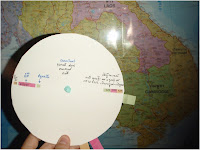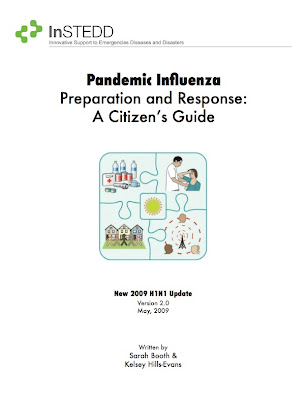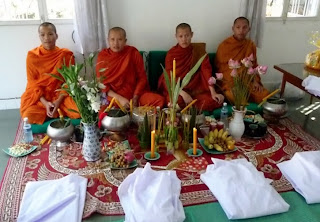Wednesday, April 6, 2011
 Continuing Blogs on InSTEDD.org
Continuing Blogs on InSTEDD.org
Posted by
Brooke
at
9:27 AM
0
comments
![]()
![]()
Monday, February 22, 2010
 Hans Rosling at the InSTEDD iLab!
Hans Rosling at the InSTEDD iLab!
Just a quick note to mention that Hans Rosling, one of the most interesting medical statisticians alive, came by the InSTEDD Innovation Lab on the day of our Buddhist Blessing Ceremony to offer a few thoughts about Cambodia to our iLab staff.
Hans, a medical doctor out of the Karolinska Institute in Sweden, has developed a set of tools for visualizing data in a simple, intuitive, and informative way, and he ruptures a lot of myths in his moving bubble diagrams. His work on HIV, on investments in the developing world, the relationships between education and child health, and more, has affected thinking - and policy - at national and international levels. He's a phenomenal teacher, and to have him spend two hours at our iLab, talking about Cambodia to our Cambodian staff (and lots of visitors for the occasion), was a wonderful stroke of good fortune.
You'll get the idea below that his work with his software, Gapminders, visualizing data from statistical databases at WHO, the World Bank, and elsewhere, was engaging, thought-provoking, and a real kick-start to the Dynamic Resource Mapping capabilities we're just now moving out into the world (see the Dynamic Resource Mapping blog below). Great timing for us, explaining why REALLY knowing what you have out there is critically important.
To get a flavor of his hours spent with us, I recommend any one of the talks that Hans has given at TED. You can see his most recent, at TEDIndia last summer, here. Other TED talks include a little sword-swallowing. He's an interesting man.
Thanks, Hans. It was a terrific day.
Posted by
rasmussene
at
1:50 PM
0
comments
![]()
![]()
Wednesday, February 17, 2010
 Prince Mahidol of Songla, Magic Wheels, and the iLab
Prince Mahidol of Songla, Magic Wheels, and the iLab
The second half of January was a blur of collaborative activity around the earthquake in Haiti. As many of our readers know, InSTEDD, with a collection of competent, attentive, and collegial partners around the world, had a team on the ground at the Port au Prince airfield within about 72 hours after the quake. We accomplished some significant and continuing good and I’ll discuss that elsewhere. February, though, began in Bangkok.
Prince Mahidol of Songla
Each year the Prince Mahidol Award Conference selects one or more global leaders in public health for recognition of their lifetime achievements. The ceremony, in Thailand, serves as a useful opportunity to hold one of the better Public Health conferences of the year. More than 1,000 attendees from dozens of countries converge on Bangkok for three days of presentations and conversations, and this year InSTEDD had a very strong presence.
Press Conference
The week began with a separate Press Conference led by the Thai Health Promotions Foundation. They were describing our new SMS shortcode for GeoChat-based reporting and alerting everywhere in Thailand, and included recognition of our implementing partners in Thailand (Change Fusion and OpenDream), our most prominent funder in the Mekong (Google.org) and our new relationship with a Thai communications company (DTAC).
We've spent a lively and interesting few months shaping a business relationship with DTAC around SMS messaging in humanitarian support. In January we all found some common ground and implemented a good first step at lowering the financial thresholds for disease reporting and outbreak surveillance. Our goal is to provide a free SMS shortcode for GeoChat use everywhere in Thailand and we’re getting there. We’re now confident that we can continue to refine our new relationship into a model for other areas of the developing world that need a reporting and alerting capability for emergencies.
Based on the later media coverage it was apparently a very successful press conference, conducted mostly in Thai, with DTAC explaining what they've done with our partnerships, and Change Fusion demonstrating a few of the new capabilities in GeoCha t. I’ve just heard this week that InSTEDD and our partners made it to the front page of the newspapers in Bangkok, and I’d already seen video from television broadcasts of the event. Although it’s all in Thai, I’ll share them here at Thai TV Video 1 and Thai TV Video 2.
t. I’ve just heard this week that InSTEDD and our partners made it to the front page of the newspapers in Bangkok, and I’d already seen video from television broadcasts of the event. Although it’s all in Thai, I’ll share them here at Thai TV Video 1 and Thai TV Video 2.
Channe Suy
A day or so later Channe Suy, InSTEDD’s Product Manager from our Innovation Lab in Phnom Penh, presented to a large Prince Mahidol audience our ideas around InSTEDD’s Innovation Lab concept, and specifically why we have one in Cambodia. She touched on the value of the open and shared space for innovative technical work that we’ve provided since 2008, and she spent some time describing our focus on capacity building, local teams working in local languages, interoperability, integration with existing workflow and tools, and how InSTEDD works toward an intersection of grassroots needs and national priorities. Channe gave a terrific talk, well delivered and well received, and I heard great comments about it throughout the rest of the conference.
Magic Wheel
One topic Channe addressed was our Magic Wheel – a physical object – that helps minimally-literate Community Health Workers report disease outbreaks in a consistent, reproducible, error-correcting fashion using a tool we’ve designed that looks a little like a circular slide rule. It received rave reviews for its simplicity, clever, intuitive, and robust mathematical structure, and its adaptability across languages. We'll talk more about it when the field testing is a little further along.
Policy and Tech
I, too, spoke at the conference. My topic was policy and technology in Health Information Systems and I spoke about the need for better guidelines around cloud computing, the challenges between transparency (public safety) and privacy (personal safety) in an emergency, a little about interoperability (as always...), code-escrows, telco contracts, capacity building, and deliberate exit strategies that leave new capabilities properly in the hands of responsible agencies. I was drawing on our work in Haiti and elsewhere (with photographs for illustration), and it was probably a bit much for a 20-minute talk, but you can judge for yourself here.
A few days later in Phnom Penh, we were all able to reconnect in the iLab, getting together as the largest single gathering of the InSTEDD team in a year, and sharing in a gorgeous and moving Buddhist Blessing Ceremony for our place and our work. It was a nice moment in the history of the lab and I think it bodes very well for the coming year.
The Innovation Lab
We had several days in Cambodia, and it was great to see the new faces as people join us, and to watch how well the iLab has moved forward to address concrete problems identified by local staff. It’s a terrific model for developing a local brain trust within a neutral space, addressing local cross-sectoral problems, and it’s getting better constantly as we learn.
We intend to adapt the iLab idea to new sites and new needs over the coming years, and we’re watching now for locations where this capacity building might be most useful. Suggestions are welcome! Drop a note to me at Rasmussen@InSTEDD.org or, if you're really excited about a possibility, call me on my cell at +1-360-621-3592.
Posted by
rasmussene
at
4:53 PM
0
comments
![]()
![]()
Tuesday, June 9, 2009
 The Economist (again!), Fuse, and Chris Blow
The Economist (again!), Fuse, and Chris Blow
Once again the Technology Quarterly section of the Economist has selected a focus on InSTEDD and our work in Asia, this time for sensors, sensitivity, and the use of mobile devices for data collection. The pleasant face you see on the GeoChat screenshot that opens the article is our Vice President for Engineering, Eduardo Jezierski, working within our Innovation Laboratory in Phnom Penh, Cambodia. More on the Lab below.
The article (which you can find here) quotes several informed and articulate sources, including staff at MIT and Path Intelligence, regarding the usefulness of mobile devices in general and our approach to data collection in particular. From my reading it's a fairly nice validation of our design and methods.
Incidentally, speaking of design and methods, many of you know we have a mesh synchronization tool called Mesh4x. It's getting used all over, from African medical clinics to the US Centers for Disease Control, but it's a programming tool, not really usable by ordinary folk.
However, we'll soon be talking more about our new Mesh4x interface client, Fuse, that will take our mesh synchronization capabilities and make them visible, intuitive, and usable by anyone who knows where their data resides. Mesh4x, our code library, works beautifully (we find a minor bug every few months and fix it) but it's been a developer's tool. Fuse will change that. Soon anyone will be able to specify an Excel spreadsheet here on my laptop, an Oracle database there on your server, a Google Earth KML layer on that PDA, a Microsoft Access table over in Atlanta, a MySQL database on your website's LAMP stack, and then press the Big Red Squishy Button that says "SYNC" and they'll all synchronize with each other across applications and across devices. I've watched pieces of that happen today and it's lovely to see. Even better is that, if access to the internet is broken or missing, it all can happen just over a stream of SMS text messages from a cellphone connected to a laptop. No internet at all.
This is very useful magic.
The Fuse synchronization interface design has to be very simple. Like all magic, that simplicity will mask a daunting complexity. One of the very talented people looking over the design of the Fuse interface is the remarkable Chris Blow. Chris has done beautiful work for our valued Ushahidi colleagues in the Open Mobile Consortium and he's now working within our Innovation Laboratory in Cambodia. Chris - a very impressive intelligence indeed - is just visiting InSTEDD, but while he's with us he's helping the Cambodian lab students learn techniques that will let them design user interfaces that make sense for their Cambodian customers. Take a look at his blog here.
Days like this are a part of the reason I love this organization. Yes, we're doing very good humanitarian work, using free and open source information tools that really surpass anything I'm seeing in the commercial sector, but what's really happening is that networks of truly remarkable people are forming around seriously hard problems facing the planet. Smart, passionate, selfless, creative people are finding a rewarding outlet for their need to be of service to humanity. Nice example of the Buddhist goal of "Right Livelihood".
Posted by
rasmussene
at
9:41 PM
0
comments
![]()
![]()
 InSTEDD in a very brief TV interview on Fox
InSTEDD in a very brief TV interview on Fox
This morning started very early, with a live Fox Business News interview about InSTEDD that you can view here. The interview was done within the fascinating Computer History Museum just off the Google Campus in Mountain View, and really, really early in the morning.
Fox was apparently pleased with the few minutes and the producer of Fox Business, Gary Kaye, came up afterwards to request a little more interview time in the future. He said he was surprised to see such an effective combination of tech and humanitarian support and wanted to know more. Stay tuned.
(Again, the link is here.)
Eric
Posted by
rasmussene
at
8:39 PM
0
comments
![]()
![]()
Friday, May 29, 2009
 A brief (but useful!) Fact Sheet about InSTEDD
A brief (but useful!) Fact Sheet about InSTEDD
Wow. Over the past few weeks, interest in InSTEDD and in our tools: GeoChat, Mesh4x, Evolve, and the Innovation Lab, with a slew of additional integration requests to our advisory staff, have each really taken off. We find we're receiving about a four requests a week for some sort of work somewhere in the world. Over the past few days, for example, we've had conversations about opportunities in Israel, Pakistan, Georgia (the one next to Belarus, not the one with peaches), Italy, and Tajikistan.
To get a jump start on some of these conversations, and to wrap our description into a neater package, we've developed a Fact Sheet. It's brief, just a two-pager, plus a page around a few of our achievements. To keep it brief we've minimized some of the very cool work being done by Taha Kass-Hout in Atlanta, and the separate work being done by Romdoul Kim and the Innovation Lab team in Cambodia, but it's enough to get the flavor of our skills.
Please feel free to download the Fact Sheet here, and don't hesitate to contact me, or anyone at InSTEDD, if there is some project you think might be interesting for us to do together. We're always watching for useful humanitarian support opportunities and we enjoy the conversations.
You can reach me, as always, at Rasmussen@InSTEDD.org, and on my direct cell at 360-621-3592.
Eric
Posted by
rasmussene
at
2:09 PM
1 comments
![]()
![]()
Saturday, May 9, 2009
 New H1N1 Swine Flu Citizen's Guide Update
New H1N1 Swine Flu Citizen's Guide Update

The new Pandemic Influenza Citizen's Guide, edited by Sarah Booth and Kelsey Hills-Evans to incorporate information around the recent H1N1 (Swine) flu outbreak, is now posted here.
Posted by
rasmussene
at
2:30 PM
0
comments
![]()
![]()







